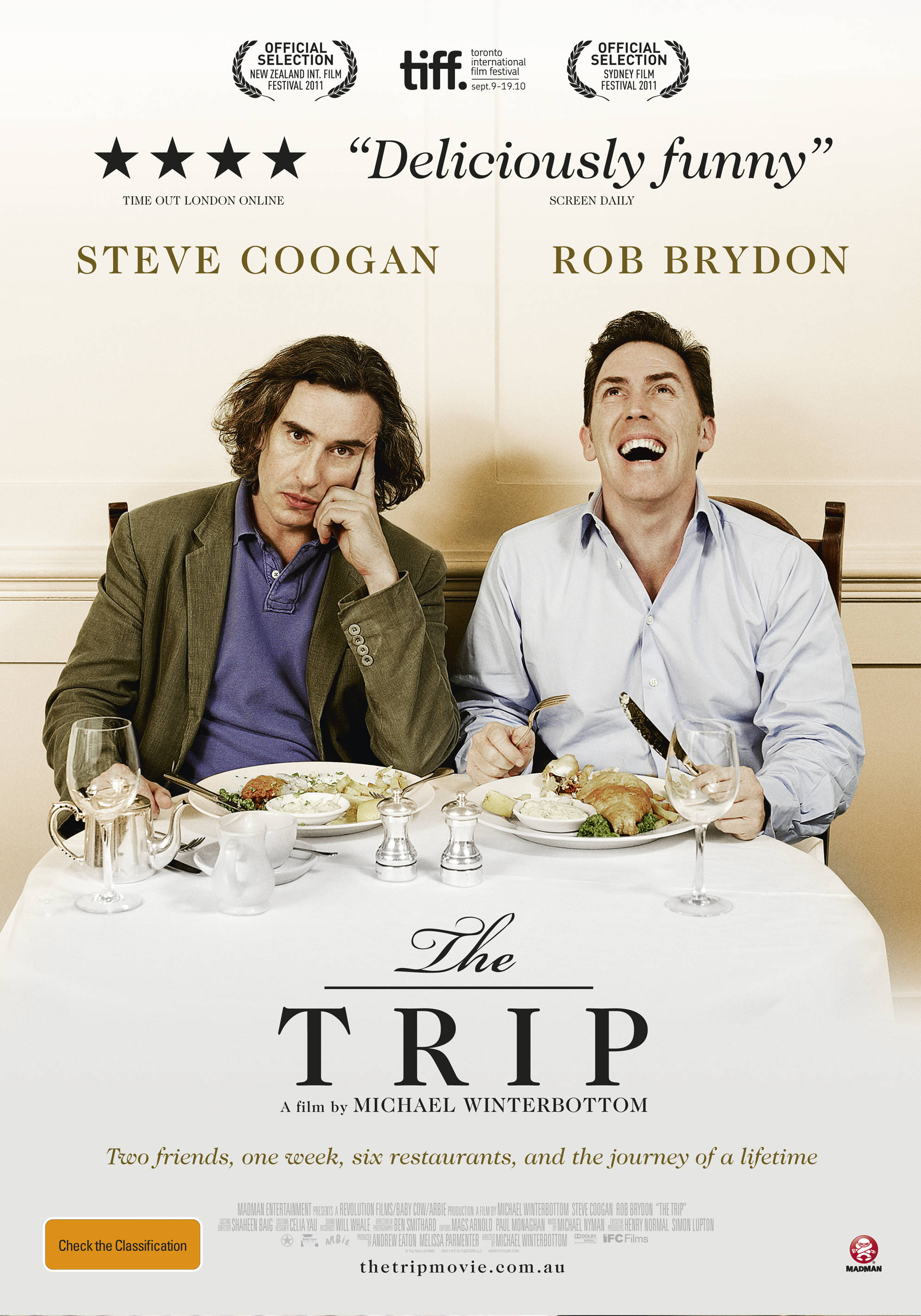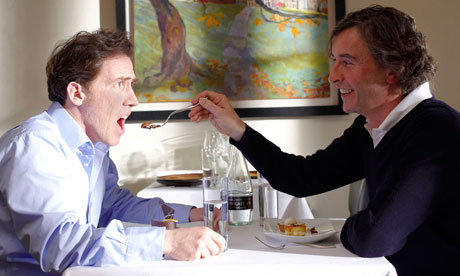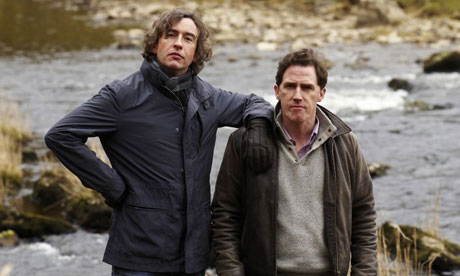
Michael Winterbottom's 2001 film 24 Hour Party People presented a new century perspective on England's theory-dense post-punk era from the late 1970s to the mid 1990s. It outlined social transformations for which postmodernism remains a relevant diagnostic tool, despite its misuse by music industry (self-)promoters like lead character Tony Wilson (Steve Coogan). In one scene the Factory Records mogul attempts to justify his flirtation with a younger woman by saying he's "being postmodern...before it was fashionable." This glib aside to camera encapsulates the television presenter's interchangeable qualities as genius promoter and intellectual con artist. Spin control that can glorify a prosaic mating ritual as stylistic innovation permeates the media and political discourse these days with formulaic ubiquity. It's a form of communication with roots deep in the historical construction of rhetoric - as age-old as the self-aware role play that Wilson and his new love interest adopt - yet adaptable to a growing cultural awareness of "the endless play of signs and signifiers."

This astute weave of pun and allusion typifies how flexible self-reflexive irony can be in Winterbottom's cinema; it's insinuated in dramaturgical form and foregrounded with brash one liners. The notion of an assumed pre-postmodernity has become a running gag in his oeuvre. Coogan returned in Winterbottom's 2006 movie about a fictitious film production of The Life and Opinions of Tristram Shandy, Gentleman to explain Laurence Sterne's radical eighteenth century novel was "postmodern, before there was anything modern to be post about."

Despite some humorous scenes between Coogan and 'co-lead' Rob Brydon, Tristram Shandy: A Cock and Bull Story was something of a misstep for Winterbottom. The major philosophical conundrums and labyrinthian narrative turns of the source text, a novel essentially about a man failing to write his autobiography due to an endless series of diversions, were reduced into a parodic film about the failure to make a film. The end result of Winterbottom's adaptive ambition is a metafiction overburdened by its intertextuality, yet too depthless to be more than ironic pastiche.
His latest six-part mini-series and film The Trip is more like a good episode of Seinfeld - a celebration of the potential for comedy in the apparent nothingness of everyday life. The self-reflexivity embodied in the Tony Wilson character's quip inhabits this view of the prosaic. It's Winterbottom's most enjoyable combination of postmodernist style and plotless story telling to date.

According to the writer/director's docu-realist method, Steve Coogan invites fellow actor-comedian Rob Brydon on an assignment reviewing northern English restaurants and boutique hotels for The Observer. As they set out on their journey, he plays Joy Division's 'Atmosphere' on his Range Rover's stereo system. It could be a reference to 24 Hour Party People, the actors' first project with this director; Coogan's description of the song as the "perfect soundtrack for this landscape," is a subtle echo of that film's fourth wall demolition.
He and Brydon portray their own simulacras, composites of fiction and real personality. Coogan is uptight and often miserable, seething with unfulfilled ambition. Brydon is more affable and content with the level of success he's achieved. They continue the combatative rivalry their alter egos had in A Cock and Bull Story, but for all of Coogan's sarcastic put downs there's also something more than a weary tolerance of the irrepressible Brydon. He concedes in a phone conversation to his son that Brydon's a "good friend", but that seems to be something he would never admit to the actor himself.

The genuine chemistry that exists between them, the tension between companionship and irritable competitiveness, creates an imitation of real life with some of the revelatory quality of John Cassavettes' films. There aren't any scenes comparable to Gina Rowlands' increasingly self-destructive Method preparation in Opening Night, the American independent film maker's examination of artistic sacrifice as everyday experience (a thematic forerunner to Darren Aronofsky's Black Swan). The Trip operates through subtle irony rather than melodrama or black comedy, but just as Cassavettes' character study revealed the mania and isolation involved in the perfection of one theatrical actor's craft, we gain insight into the dedication required to develop the skill set of the professional comedian.
Rob Brydon has made social interaction an extension of his practice routine, throwing impersonations into normal conversation at every opportunity. There's an element of Ricky Gervais' comedy of embarrassment here - a sense of "doesn't this guy have an off switch?" Coogan disdainfully labels Brydon an 'autistic impersonator,' but we later see Coogan practising some of the same voices into his hotel room mirror, such as Brydon's small-man-stuck-in-a-box routine, with a similar neurotic dedication.

The impersonation is a cornerstone of many stand-up routines, but with a show's peaks come longueurs - sections where a story drags on too long, a joke is stretched too thin. Audience anticipation is also a frustrated willing of the comedian to get back on form. No matter how personable the stage performer, an inherent power dynamic is always palpable. Impersonations in The Trip are part of the fabric of a performer's everyday life, without set-ups and the distancing of public address. During a discussion about Coogan's love life, Al Pacino emerges, all bulging eyes and New York 'tude, from out of Rob Brydon's face as though he were possessed by one of Sybil Dorsett's alters. He christens his friend "Don Coogan" much to Coogan's annoyance. There's an appearance of unconscious naturalism, as though Brydon is an egoless channel for comedic invention, but as there's no telling where improvisation and script begin or end, the impression could be as artificial, as scripted, as one of the 'real' Brydon's television routines. Notions of performance and authenticity are mutable in these two-hander comic scenes, a satisfyingly subversive texture.
The incessant trading of pop cultural referents in The Trip brings Quentin Tarantino's cinematic world to mind. The American director's work pops up explicitly when Coogan and Brydon begin versioning Abba's 'The Winner Takes It All' in an empty hotel bar. Brydon tries to imitate the song's Swedish composer Björn Ulvaeus reciting the lines he wrote for the group's singer Agnetha Fältskog to perform. Coogan chides the Welshman for sounding like "the Nazi in Inglourious Basterds."

The duelling Michael Caines scene has already acquired some of the aura of classic comedy, but there's an equally impressive duelling Woody Allens. This duel is more relaxed, coming at a time when they're both comfortable in each other's company. They trade their impressions of the Allen persona, with less putdowns and aggressive one-upmanship, like a casually tossed frisbee.
The charm and underlying depth of the whole show owes a lot to this casual quality; two actors semi-improvise a docu-fiction about their everyday lives, the easygoing vibe in tension with an undercurrent of personal tragedy. Long distance phone calls between Coogan and girlfriend Mischa (Margo Stilley) provide narrative substance, but not enough to take us down the clichéd pathways of romantic comedy. Narcissistic dream sequences inject an element of Pythonesque humour, reaffirming the documentary conceit by momentarily shattering it.
Brydon's and Coogan's comic talents are key elements of the program's success - it's hard to imagine any other combination of actors maintain viewer interest as two guys eating in restaurants and visiting tourist sites. It's Winterbottom's formal playfulness that most suitably frames the constant movement between authenticity and artifice in their performances. Going beyond the dubious tribute of parody, he reveals himself as a more worthy inheritor of Sterne's literary innovations. The Trip has all the benefits of influence, less of the anxiety.
Text: (C) JONATHON KROMKA 2012